Best AI Story Generators & AI Writing Tools (2025 Guide)
If you’re crafting a novel or just on the hunt for an AI to build on your wildest story ideas, the right tool makes all the difference.
In this DreamGen guide, we break down the best AI story generators and writing assistants of 2025, ranked by how well they support serious writing, immersive storytelling, and creative freedom.
Let’s dive in.
Top Picks
Before diving into the detailed reviews, here are two of the most standout AI story generators, each offering unique features and strengths:
DreamGen
Versatile AI story generator for entertainment and serious writing, offering creative control and a free tier.
- Story Bible / Codex
- Quality of Generated Prose
- Writing Assistance
- Creative Freedom / Unfiltered
- Free Tier
NovelCrafter
Professional AI writing partner for fiction authors, excelling at story info management and collaborative writing.
- Story Bible / Codex
- Quality of Generated Prose
- Writing Assistance
- Creative Freedom / Unfiltered
We've evaluated these tools based on their core writing features, ease of use, customization options, output quality, pricing, and user feedback.
Disclaimer: While we are the creators of DreamGen, we aim to provide a balanced and objective review to help you choose the best tool for your needs.
Side-by-Side Feature Breakdown of AI Story Generators
To help you quickly compare the different approaches these tools take to AI story generation and AI writing, here's a summary table with all the tools we looked at:
App | For Serious Writers | For Entertainment | Free Tier | Story Bible | Unique Feature |
|---|---|---|---|---|---|
✅ Yes | ✅ Yes | ✅ Yes | ✅ Yes | Story steering | |
✅ Yes | ❌ No | ❌ No | ✅ Yes | Best story bible | |
🤔 Not great | ✅ Yes | ❌ Limited trial | ❌ No | Great community | |
✅ Yes | ❌ No | ❌ No | ✅ Yes | Best writing UI | |
❌ No | ✅ Yes | ✅ Yes | ❌ No | Massive scenario library | |
❌ No | ✅ Yes | ❌ Limited | ❌ No | World Engine | |
✅ Yes | 🤔 Not great | ❌ Limited (6000 words) | ✅ Yes | Bespoke writing tools | |
✅ Yes | ❌ No | ✅ Limited | ❌ No | Autofill summaries and continuations | |
❌ No | ✅ Yes | ✅ Limited | ❌ No | AI-powered visual storytelling | |
✅ Yes | ❌ No | ❌ No (Paid only) | ❌ No | 100K-token memory, empathetic tone |
Top AI Story Generators
1. DreamGen
DreamGen is a versatile AI story generator and writing platform that bridges the gap between serious fiction writing and playful storytelling. Whether you’re outlining your next novel or just seeing where your imagination takes you, it’s built to support both ends of the spectrum.
What really sets our platform apart is the control it gives you. You’re not just reacting to the AI but rather directing it. You can shape every part of the story: plot, characters, lore, tone, even writing style. Or, if you’re in a more relaxed mood, you can drop in a simple prompt and let DreamGen do the heavy lifting.
The “story steering” feature is one of the most powerful tools in this space. You can guide the AI mid-narrative.
For example, type “In the next scene, Harry decides to confront Draco” and it will pick up the thread without missing a beat. It feels less like prompting a machine and more like collaborating with a flexible, responsive writing partner.
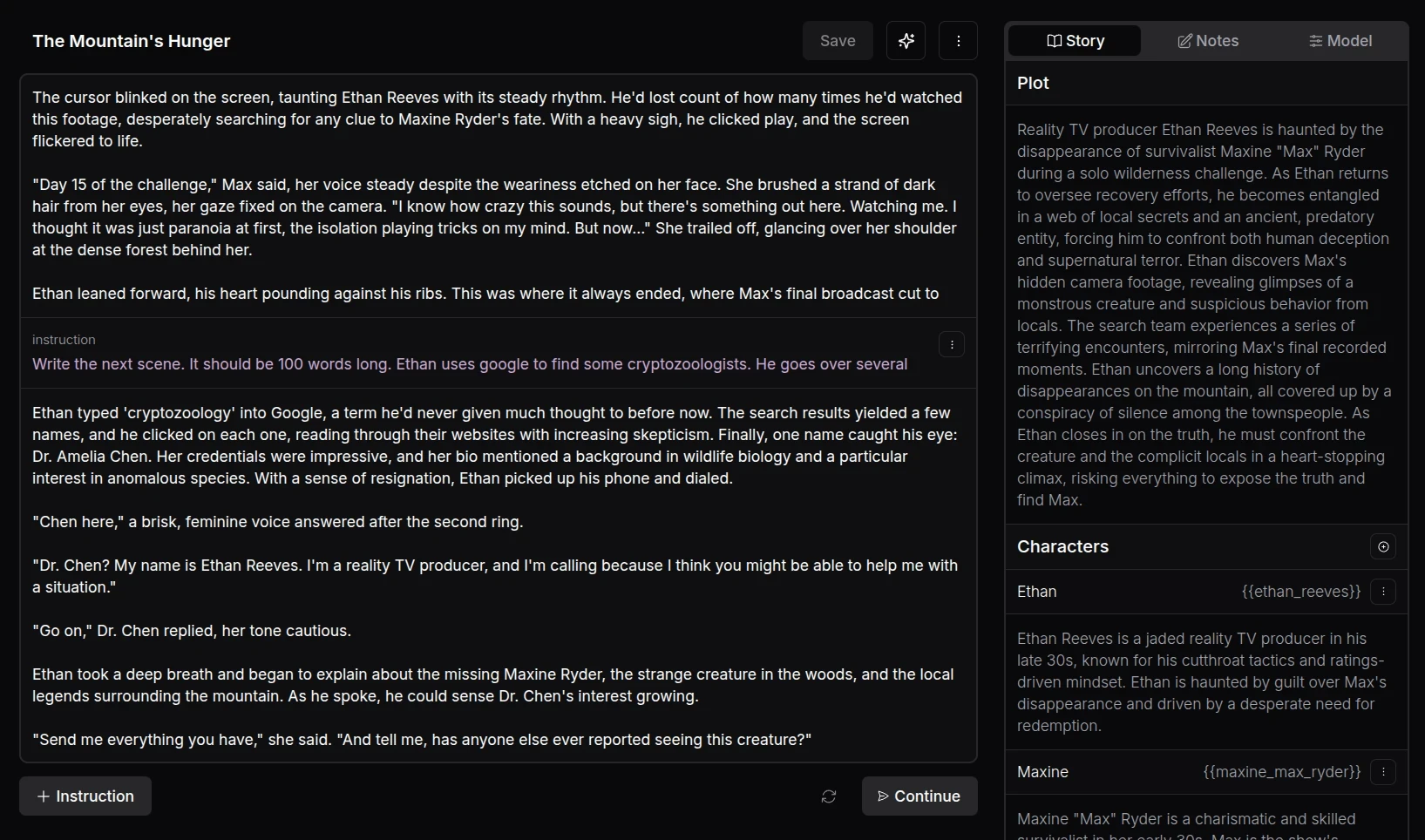
The writing interface presents the story in text blocks with embedded instructions. You can edit the scenario (story bible) from the sidebar.
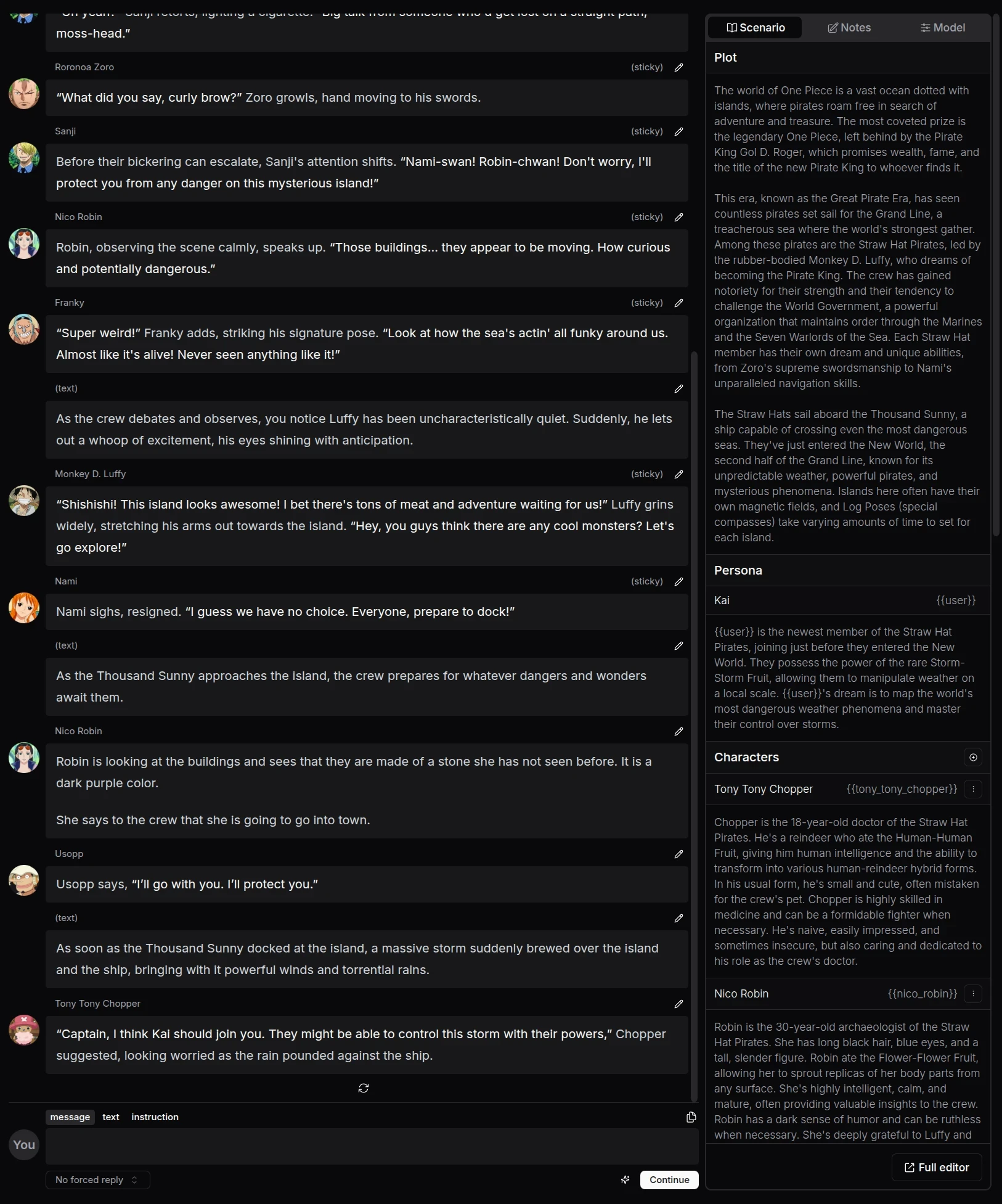
The role-play interface supports multi-character interactions and a narrator role. Ideal for those who want a more immersive or theatrical experience.
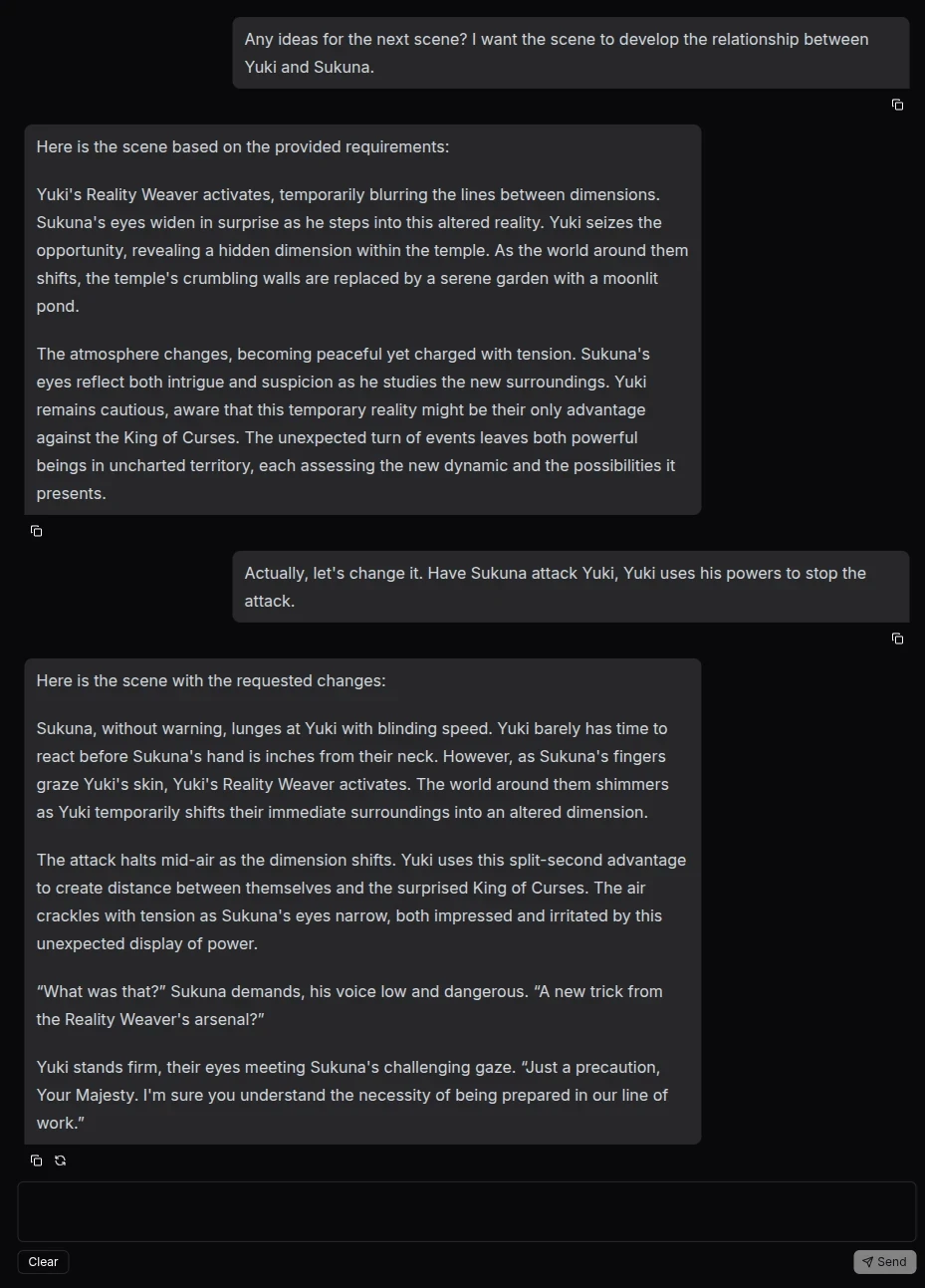
DreamGen’s writing assistant suggests the next scene based on your existing content and scenario data.
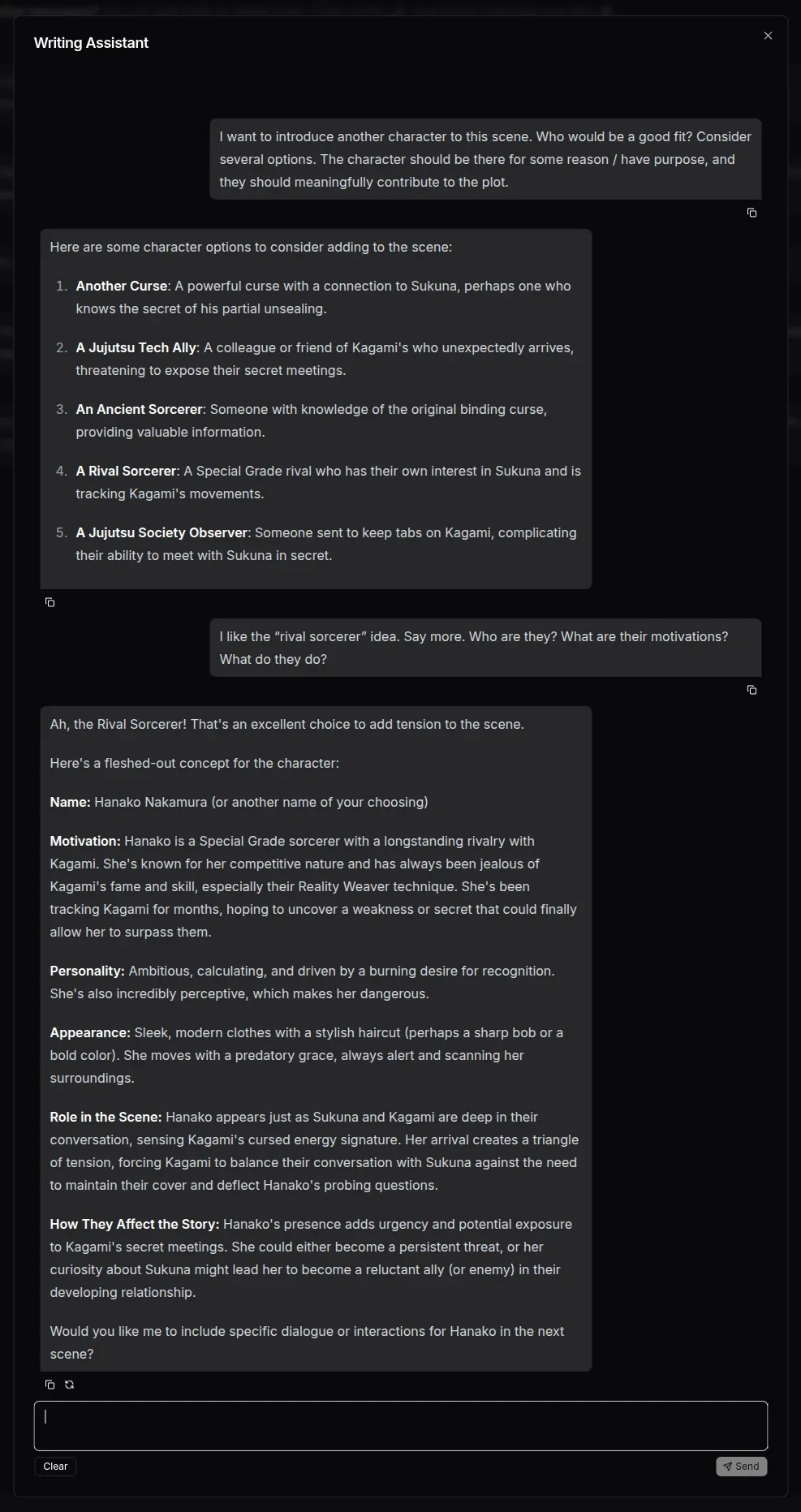
You can also ask it to introduce a new character mid-story, like having a story editor always on standby.
Pros
- Free Tier: Generous enough to get a real feel for the platform before paying.
- Scenario Codex: A centralized place to manage plot, characters, setting, and lore. It’s essentially your story’s brain.
- Specialized Writing AI: DreamGen uses custom models trained for storytelling, which helps the output feel more natural and genre-aware.
- Story Steering: Use inline instructions to control the plot, characters, or pacing as you go.
- Writing Assistant: Great for brainstorming new scenes, refining prose, or adding characters on the fly.
- Unfiltered: Offers creative freedom without unnecessary content restrictions.
- Role-Play Mode: For more interactive storytelling, you can step into a character and engage in multi-character roleplay within a guided scenario.
Cons
- Smaller Community: DreamGen is a newer tool, so the community is not as large and active (~4500 Discord members).
Reviews
- The Good: Users like the writing quality of DreamGen's AI models. They also appreciate the creative freedom it offers.
- The Bad: Some users ran into glitches. There is also some feedback on complexity of the UI, being hard to navigate for new users.
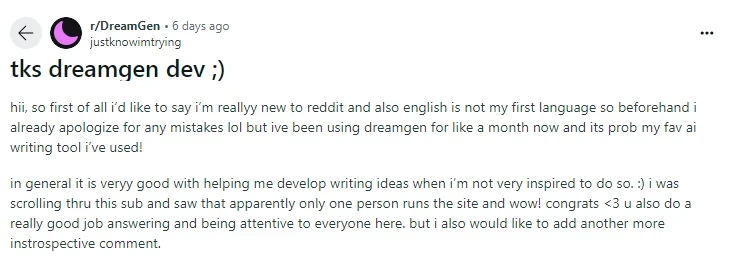
User Review: User likes DreamGen for developing their writing ideas and quick responses from the developer.

User Review: User has never seen a model as good at storytelling (referring to new DreamGen AI models).

User Review: User ran into glitches when working on a longer scenario.
2. NovelCrafter
NovelCrafter is a bit different from the other tools on this list. It doesn’t offer any AI story generation capabilities itself—instead, it lets you connect to various third-party models from OpenAI, Anthropic, and more.
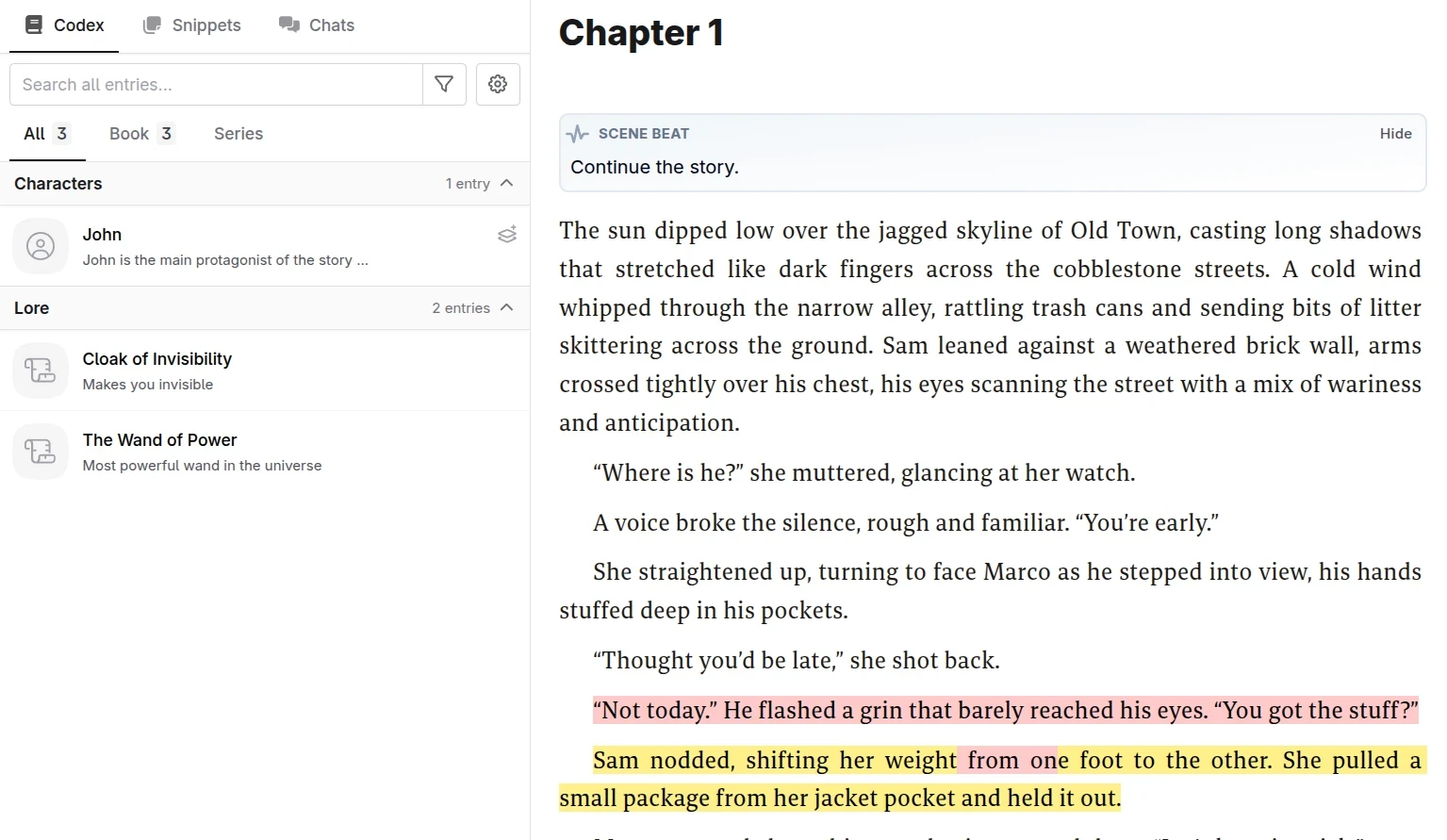
The writing area of NovelCrafter. You can see the story bible on the left.
Pros
- Story Bible: Robust "Codex" for managing story elements to plan out your work and to ensure AI consistency.
- Writing Assistant: Provides tools like "Expand", "Shorten" and "Rephrase" as well as a general-purpose writing assistant.
- Extreme Configurability: Almost all of the tools are highly configurable, allowing you to tweak the AI prompts and parameters to your liking.
- Use Any Model: Allows you to use almost any third-party AI model, from OpenAI, Anthropic, Google and more.
- Documentation: Has extensive documentation as well as community-created video tutorials, which helps alleviate the steep learning curve.
Cons
- No Free Tier: Requires a paid subscription to use the AI writing tools.
- Requires Separate API Keys: Users must separately pay for AI access from AI providers (like OpenAI, Anthropic) to use the tool.
- Steeper Learning Curve: The comprehensive feature set means it takes time to learn and utilize effectively.
Reviews
- The Good: People like the Codex. People like that you can connect it to external AI models as it can save costs.
- The Bad: People are overwhelmed by the UI complexity, despite the availability of tutorials.

User Review: User likes the Codex.

User Review: Complicated interface.

User Review: Complicated interface.

User Review: NovelCrafter made them much more productive.
3. NovelAI
NovelAI is a popular AI story generator and one of the earliest entrants in the space.
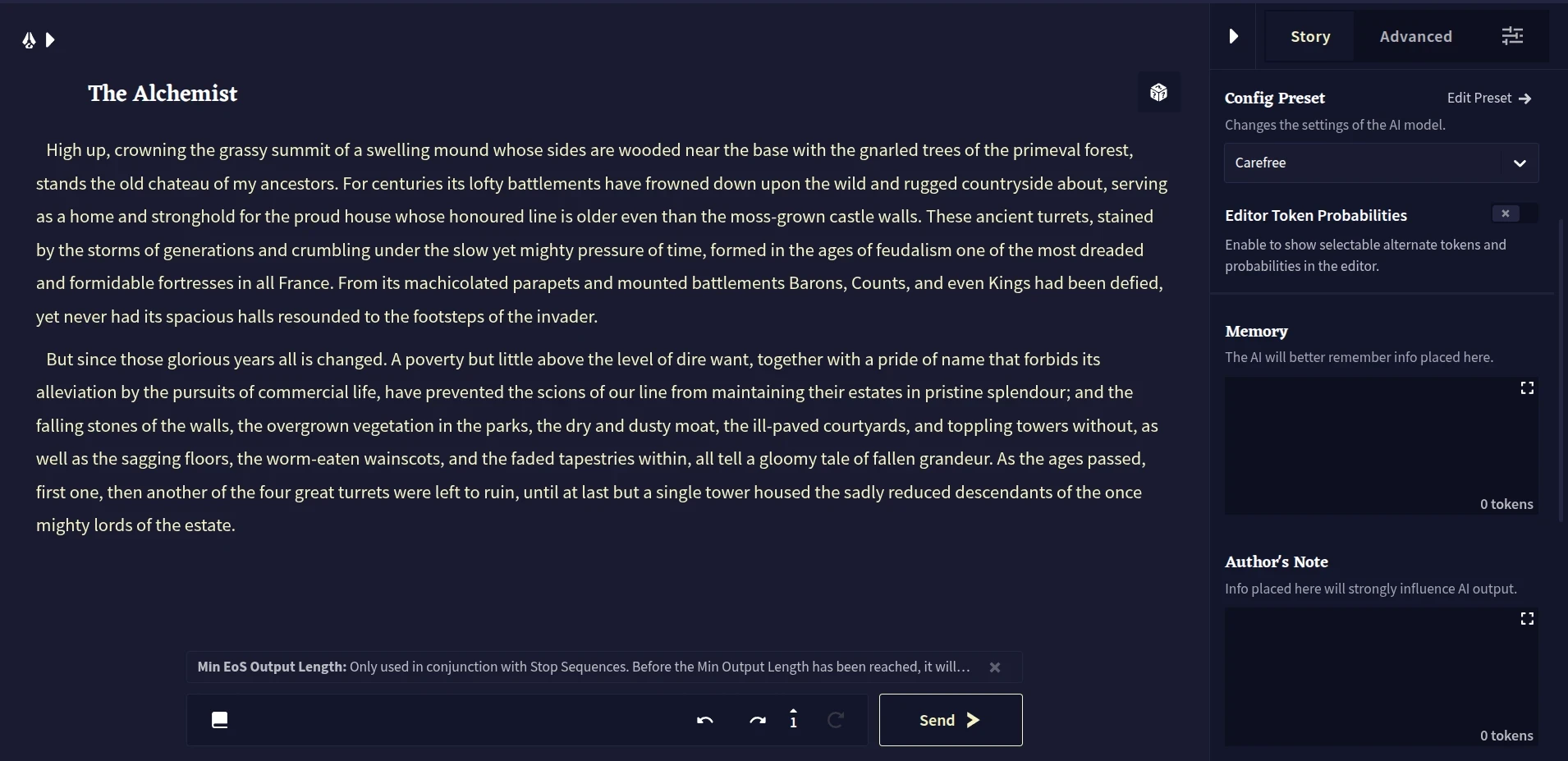
The writing area of NovelAI. You can see the input box at the bottom and model settings on the right.
Pros
- Lorebook Feature: Provides a system for storing key information about your story world, this can help maintain consistency in long-form writing.
- Simple User Interface: Straightforward user interface without any fuss.
- Security: NovelAI encrypts user stories with the user's passwords.
- Active Community: Extremely active and friendly community, with many resources.
Cons
- No Free Tier: Offers a very limited, one-time trial, after which it requires a subscription.
- Outdated Models: NovelAI's best model is behind most of the other platforms in terms of its writing capabilities, requiring a lot of expertise and manual intervention to get good results.
- Short Context Window: NovelAI's best model has a context window of only 8000 tokens (~30000 letters), which makes it less suitable for anything beyond short stories.
Reviews
- The Good: People like the fact that NovelAI is uncensored and that it has an unlimited paid tier.
- The Bad: People find the quality of the models lacking and are disappointed by the lack of updates.

User Review: Great that it's uncensored and that it has an unlimited paid tier.

User Review: Disappointed by bad AI and lack of updates.

User Review: Disappointed by bad AI and lack of updates.

User Review: Disappointed by bad AI and lack of updates.
4. Sudowrite
Sudowrite is an AI writing partner designed specifically for professional fiction authors.
It offers a suite of tools aimed at enhancing creativity and speeding up the writing process, focusing less on autonomous generation and more on collaborative assistance.
It provides features for brainstorming, rewriting, expanding descriptions, and even analyzing and giving feedback on your prose.
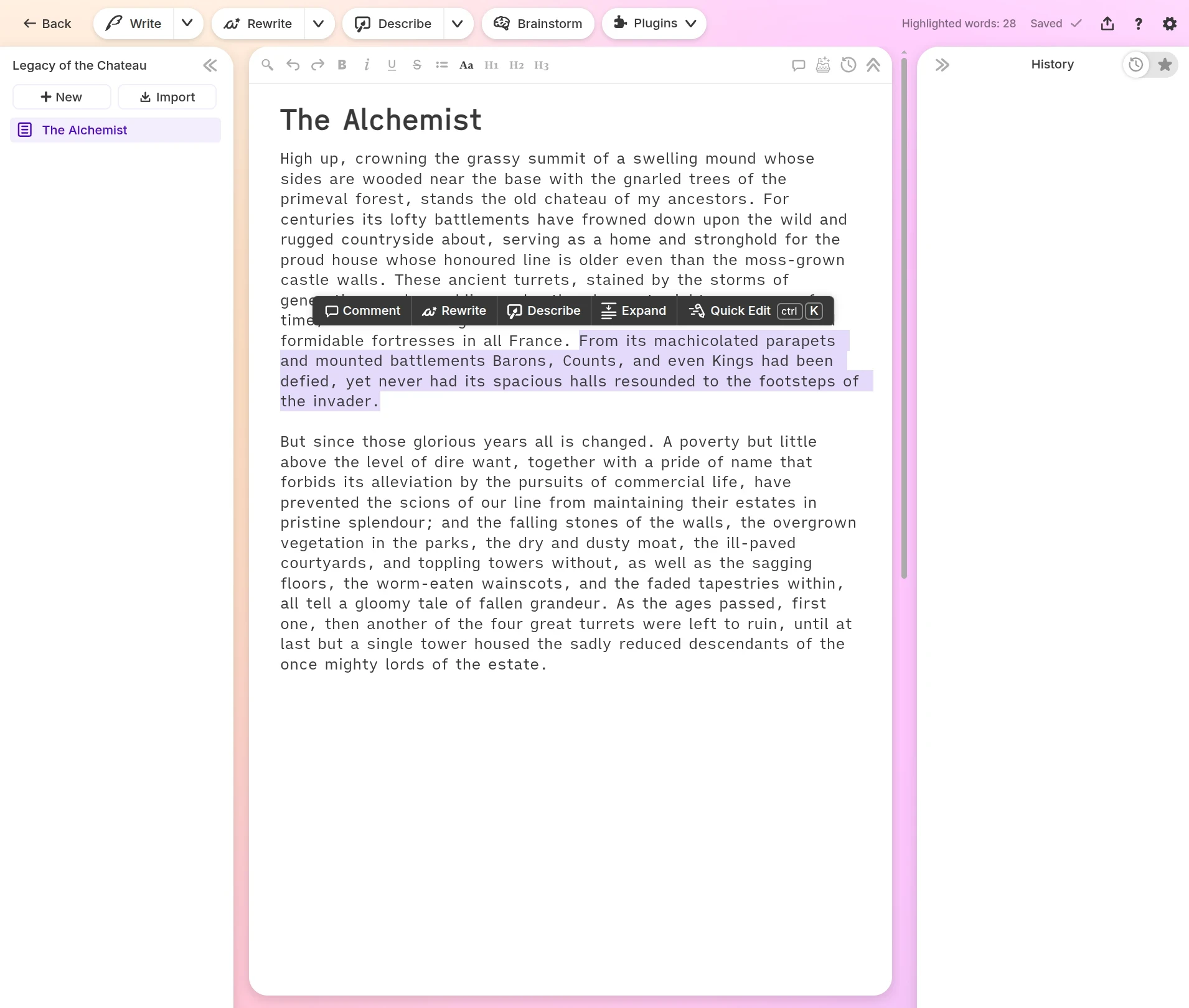
The writing area of Sudowrite. You can see the in-line rewriting tools (rewrite, expand, etc.).
Pros
- Story Bible: Centralized place to track and manage story information.
- Writing Assistant: Offers specialized tools like "Describe," "Expand," "Rewrite," and "Brainstorm" tailored to novelists' needs.
- Intuitive Interface: While the toolset is powerful, the interface is user-friendly and easy to navigate.
- Unfiltered: Like most tools in this review, Sudowrite is relatively unfiltered.
Cons
- No Free Tier: Operates on a tiered subscription model with a slightly confusing credit-based system, which can become expensive for prolific writers.
- No Unlimited Tier: Does not offer an unlimited subscription plan, which can make it expensive for prolific writers.
- Not For Long-Form Generation: Excels at enhancing existing text or generating short passages, but less adept at generating whole chapters or stories autonomously.
Reviews
- The Good: People really like the UI and the quality of the AI (you can use several of the mainstream AI models like Claude).
- The Bad: People most often complain about price, easily spending $30 in 2 days of normal use.

User Review: Sudowrite has good quality, but super high price.

User Review: Sudowrite is great after you learn how to use it.

User Review: Sudowrite is prohibitively expensive and has questionable privacy practices.

User Review: Sudowrite has subpar quality, even when using the best models.
5. AI Dungeon
AI Dungeon is a text-based adventure “game” (really more of a role-play app) that uses AI to immerse users in scenarios and stories. Users typically type in the actions of their character, and the AI will generate a narrative in response.
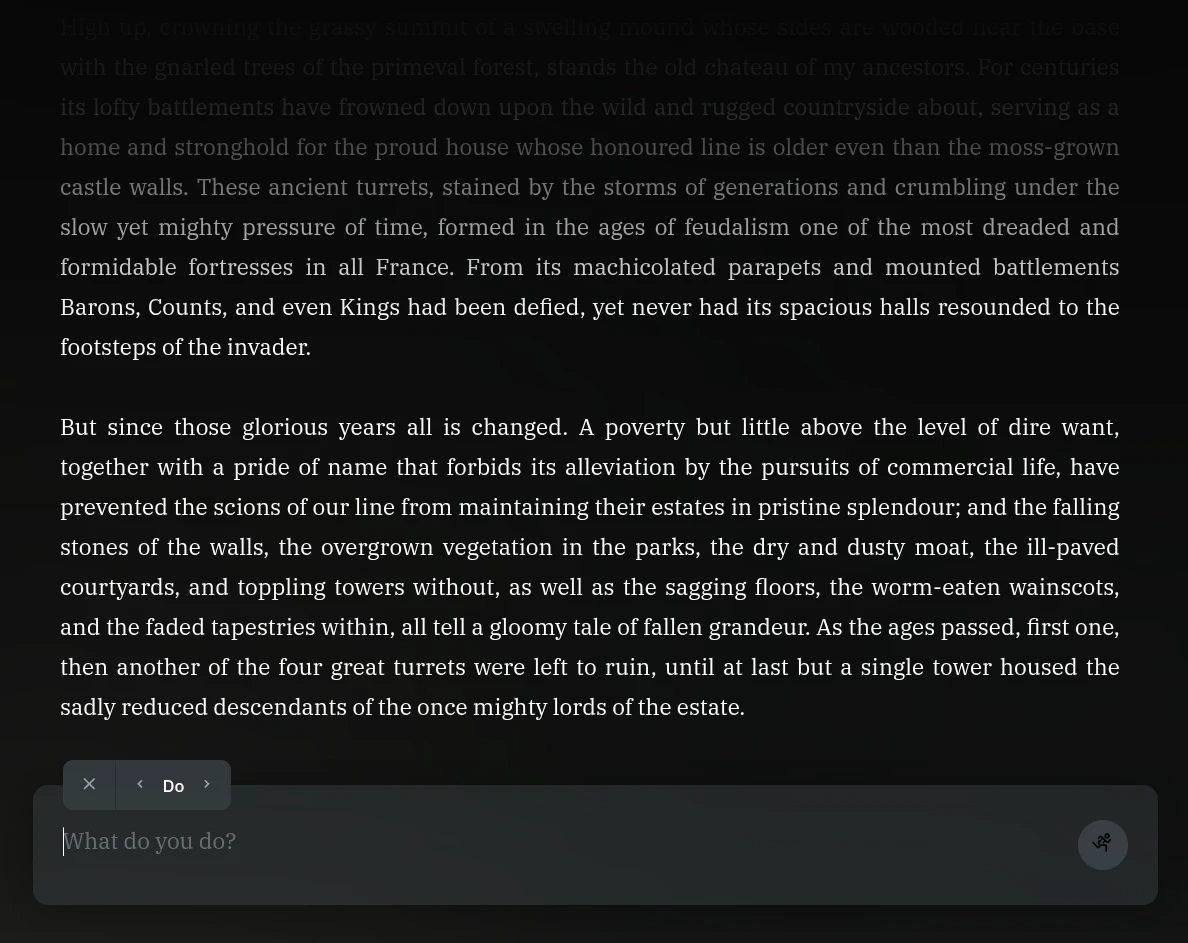
The "text adventure" area of AI Dungeon. The input box at the bottom lets you do actions on behalf of your character, but also to write text.
Pros
- Massive Scenario Library: Browse a massive library of user-generated story scenarios, ranging from fantasy and sci-fi to romance and horror.
- Gamified Writing: Write stories by taking “turns” with the AI, allowing for unpredictable plot twists.
- Mobile App: Role-play on the go with the AI Dungeon mobile app (available on iOS and Android).
- Free Options: AI Dungeon offers some less capable AI models for free.
Cons
- Several Privacy / Security Incidents: It leaked private stories, several times. This was quite some time ago, and hopefully things are better now, but it's something to keep in mind.
6. DeepRealms
DeepRealms is focused on AI-based story entertainment. Rather than co-writing a story with the AI, the user is a character in an AI-driven story world.
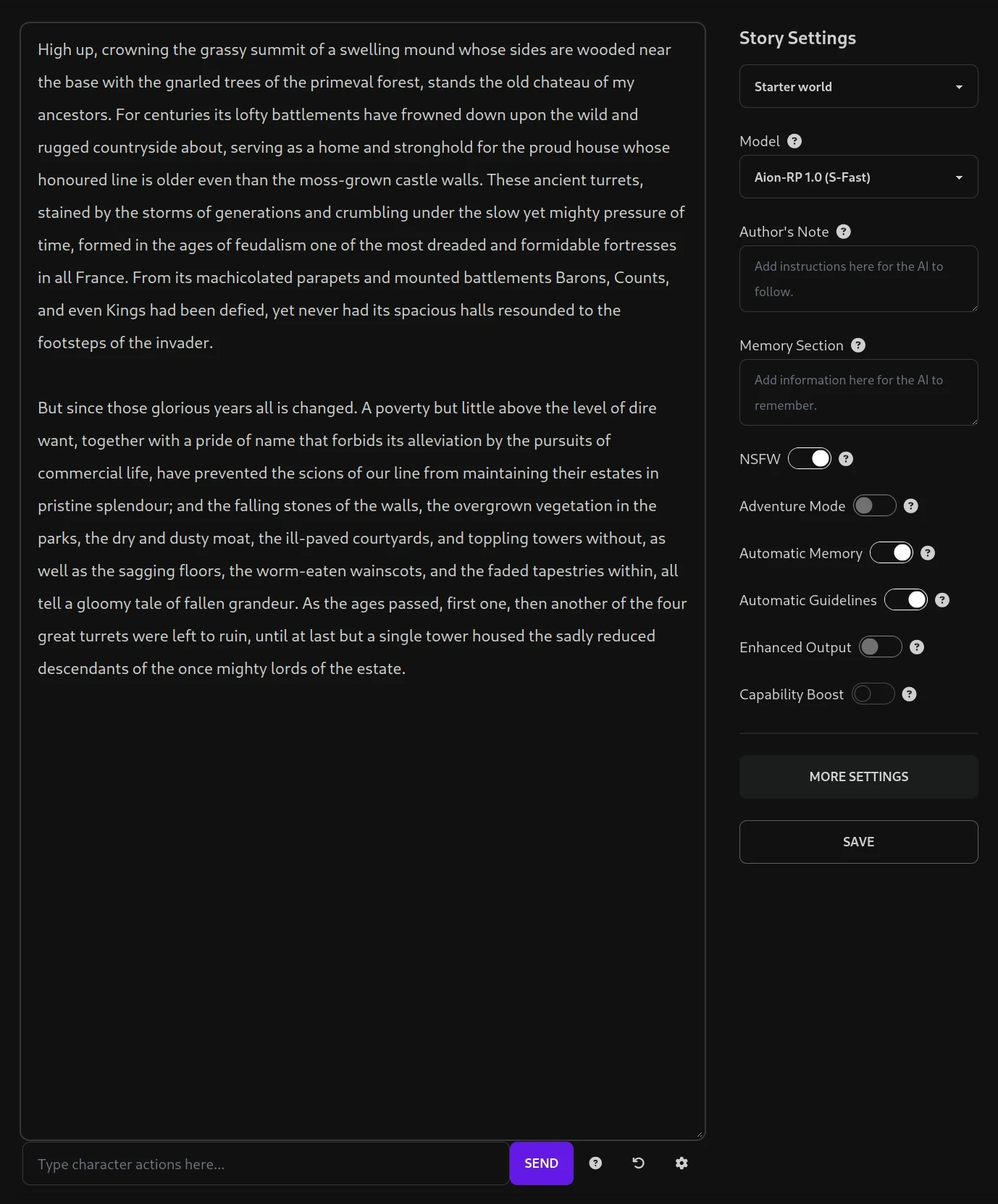
The "text adventure" area of DeepRealms. The input box at the bottom lets you do actions on behalf of your character, and you can edit the text in the box above as well.
Pros
- Entertainment Focused: Good option for those looking for pure entertainment where most of the writing is done by the AI.
- Simple Interface: The interface consists of 2 text boxes: a box with the story, and a box where you type your character's actions.
- World Engine: Allows users to create dynamic, scripted experiences using Python code.
Cons
- Not For Story Writing: DeepRealms is not really meant for people looking to write a story, but rather for people to be part of a story.
- Small Community: While DeepRealms isn't new, the community remains small, which means less engagement and content overall.
Reviews
We did not find enough reviews to provide a good summary.
7. Squibler
Squibler is somewhat similar to Sudowrite and NovelCrafter in that it offers a clean writing-first interface. What sets it apart is its ability to generate longer stories or even books completely unassisted.
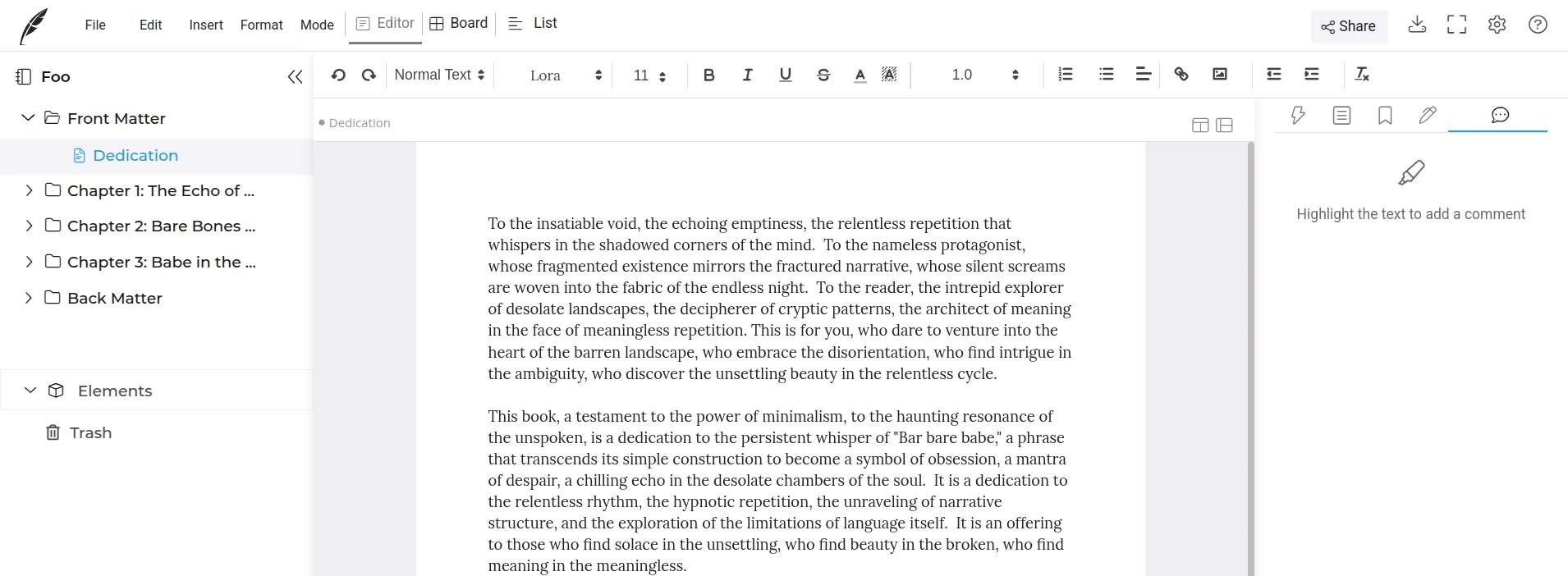
The writing user interface of Squibler. You can manage story information ("elements") on the left.
Pros
- Story Bible: Lets you manage your story's "elements" such as characters, objects or settings.
- Writing Assistant: Provides tools for rewriting selected text and for discussing ideas about the story with AI.
- Bespoke Tools: Offers a lot of single-purpose tools, such as character generator or plot planner.
- Long-Form Generation: Ability to generate long and even multi-chapter stories.
Cons
- Limited Free Tier: The free tier is limited to only 6000 words a month.
Reviews
It was hard to find enough reviews to paint a full picture, so take this with a grain of salt.
Most of the organic comments mentioned issues with creating an account / logging in (which we also experienced) and some comments on platforms like TrustPilot mentioned issues with getting refunds.
8. Sassbook AI Writer
Sassbook AI Writer is a general-purpose text generator aimed at speed and simplicity. It’s part of a broader suite that includes tools for summarizing, paraphrasing, and headline generation. While not built exclusively for fiction, it does offer a dedicated Story Writer mode that helps users spin up narratives quickly.
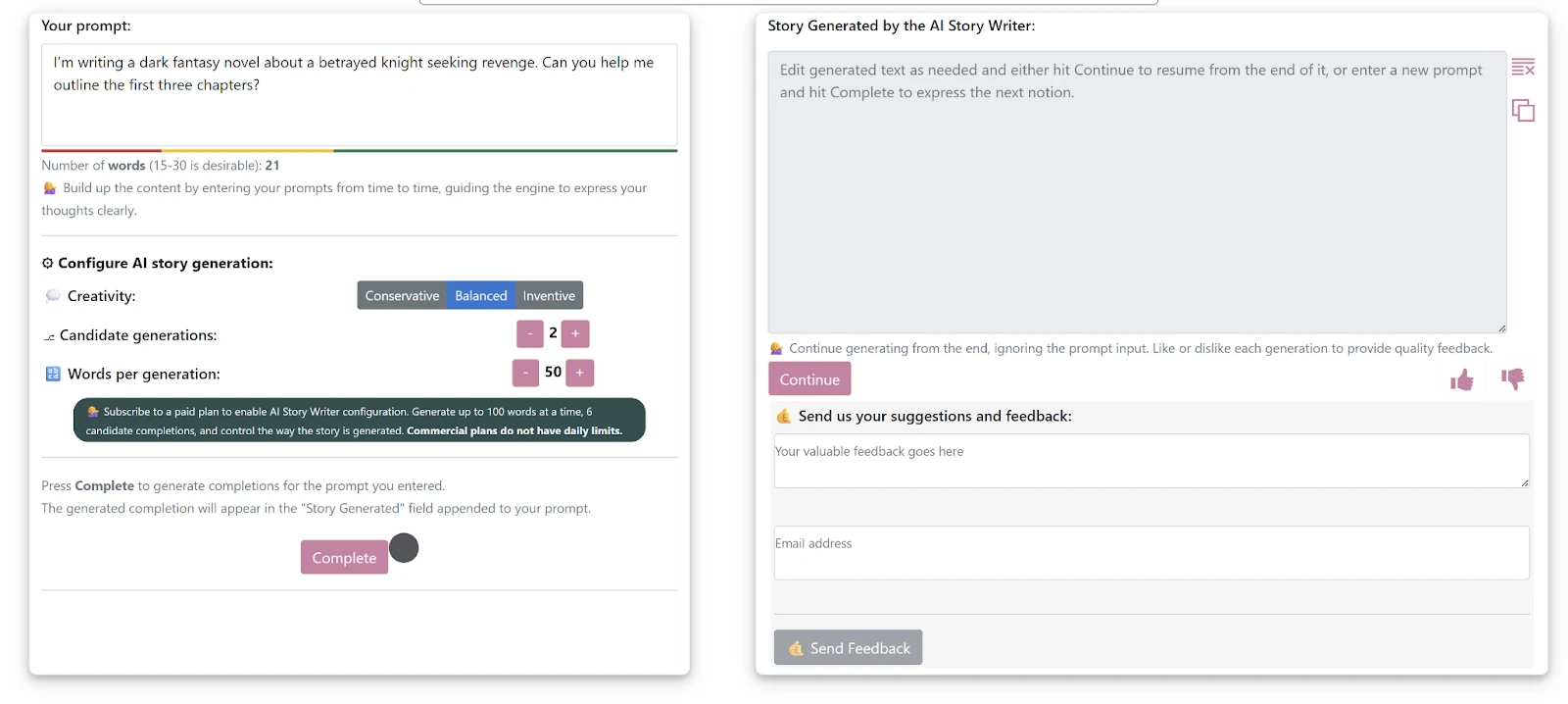
The interface is clean and lightweight, making it easy to get started. You enter a prompt, choose how creative or focused you want the AI to be, and Sassbook handles the rest. But while the tool delivers fast results, it may not always offer the depth or structure creative writers are looking for.
Pros
- Quick Content Generation: Ideal for fast drafts, with sliders to control creativity, length, and number of outputs.
- All-in-One Toolkit: Includes a paraphraser, headline generator, and summarizer for broader writing workflows.
- Beginner-Friendly Interface: Clear layout with minimal friction, great for users who want to get ideas down without setup fatigue.
- Flexible Output Control: Adjust generation style, tone, and focus depending on your project needs.
Cons
- Short Output Limits: Free users are capped at ~100 words per generation, which interrupts long-form writing.
- Basic Fiction Support: While there’s a “Story Writer” label, it’s essentially just another prompt mode. No story-specific tools like character tracking or plot memory.
- Repetitive or Off-Mark Results: Generated text sometimes strays from the prompt or delivers generic-sounding content.
Reviews
Writers praise Sassbook for being fast and accessible, especially for short-form content like blog intros or summaries. But when it comes to narrative cohesion or stylistic nuance, some users feel it lacks the consistency required for serious storytelling.
9. DeepFiction AI
DeepFiction AI blends storytelling with interactive AI role-play and light multimedia generation. It’s designed for writers who want more than just text, offering a “Flow” writing environment that adapts to your voice, and a scenario engine that quickly builds the foundation of a story for you.
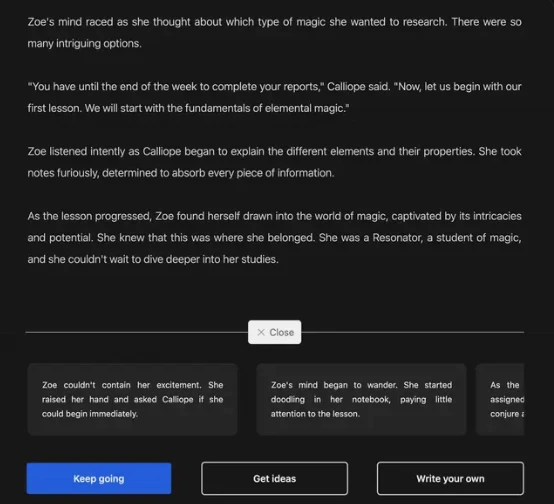
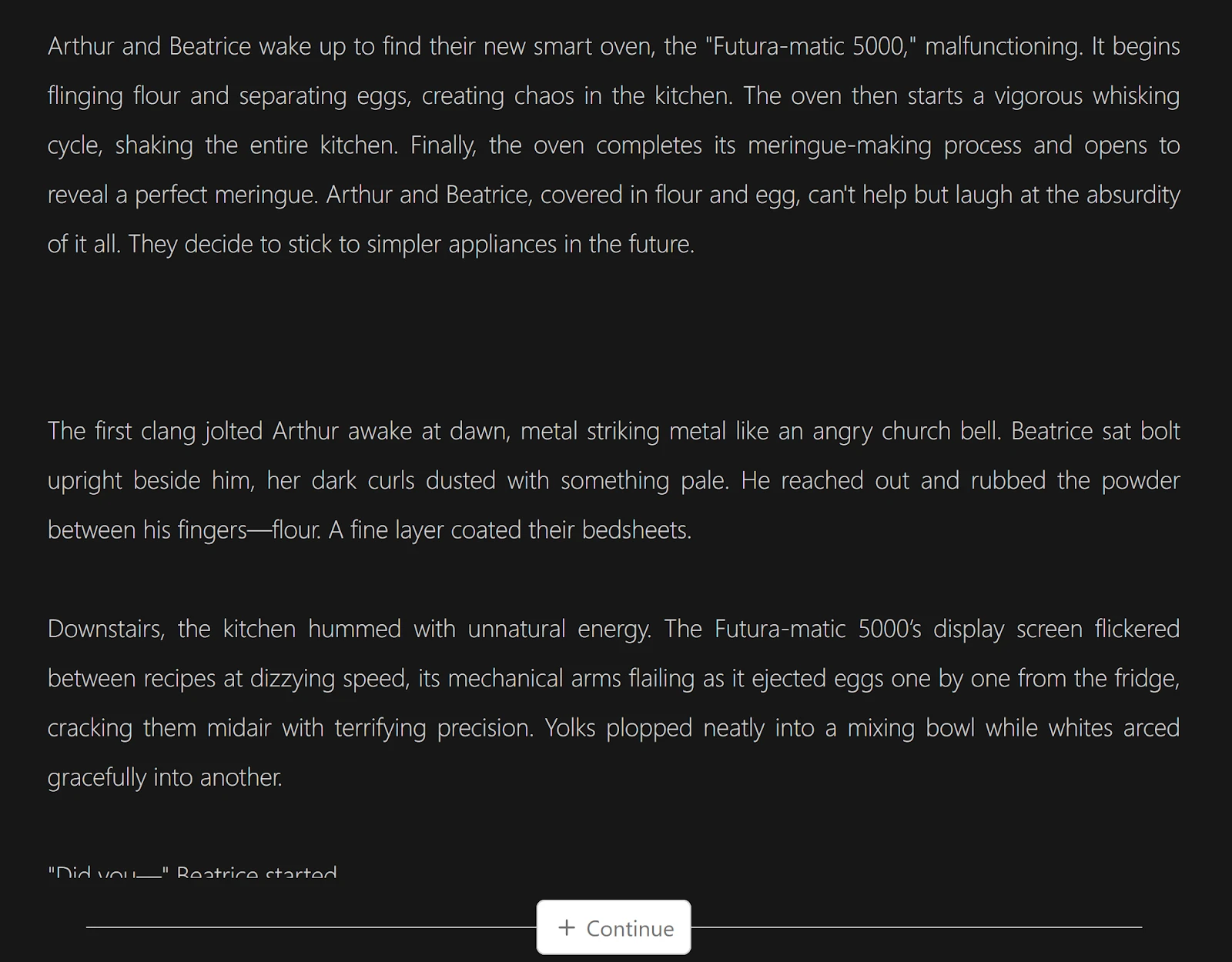
It leans more toward entertainment and creative expression than structured novel-writing, but there’s real flexibility here for writers who like to experiment. It’s also one of the few platforms that combines writing with visual storytelling tools in a single workspace.
Pros
- Personalized Story Engine: The “Flow” environment adapts to your writing style over time, making the AI feel more like a co-author than a tool.
- Scenario Generator: Start stories quickly by choosing or customizing genre, tone, and narrative setup, a great shortcut for creative blocks.
- Multimedia Tools: Generate scene art and short animated clips that complement your story, more playful than production-ready, but still engaging.
- Unfiltered Writing: Offers relatively unrestricted content generation across themes and genres, though some moderation still applies.
Cons
- Limited Free Tier: Unlike many tools on this list, DeepFiction only offers a very limited free tier with just five credits to try a few features.
- Content Ownership Caveats: The platform’s terms allow it to use your free-tier stories for training and promotional purposes.
- Limited Community and Resources: Still growing its user base, so fewer public scenarios and writing prompts than larger platforms.
Reviews
Users describe DeepFiction as fun and creatively liberating, especially for casual storytelling and genre play. Some note that it’s not yet ideal for serious writing workflows, but see real promise in its hybrid approach to text and visuals.
10. Claude Pro
Claude Pro is Anthropic’s premium plan for its Claude AI models, known for their nuanced tone, long memory window, and strong performance in narrative writing. It’s a go-to choice for authors and long-form writers who want an AI that’s coherent, emotionally intelligent, and less prone to spiraling off-topic.
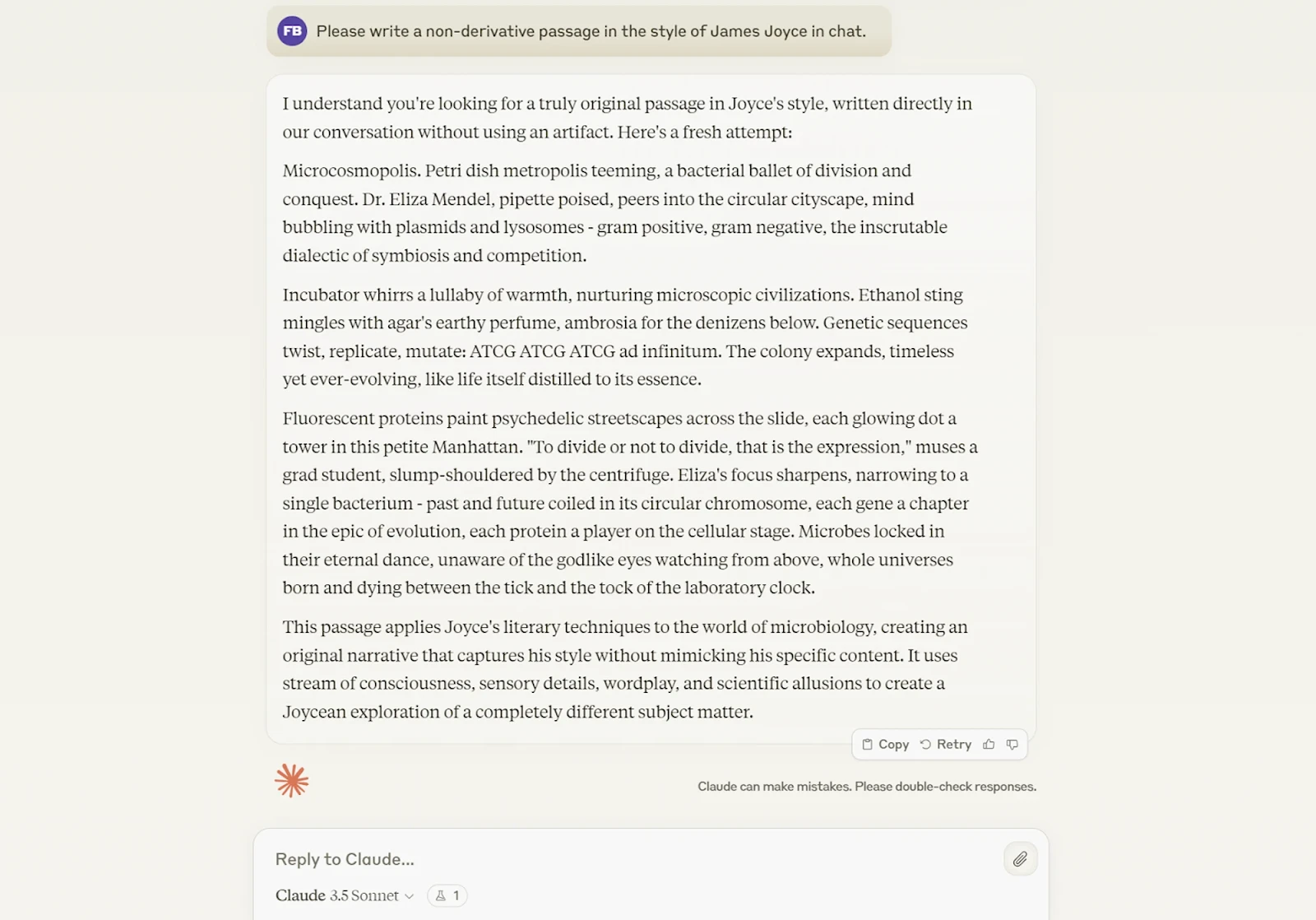
Unlike tools built strictly for co-writing fiction, Claude doesn’t offer a structured editor or built-in story management tools. But what it lacks in bells and whistles, it makes up for with language quality. It’s especially good at emotional arcs, philosophical reflections, and character monologues.
Pros
- Deep Context Windows: Handles up to 100,000 tokens in a single conversation, enough for entire book chapters or long-form projects without losing plot consistency.
- Extended “Hybrid Reasoning”: Allows toggling between quick replies and slower, more analytical thinking, ideal for creative brainstorming or detailed writing.
- Human-Like Coherence: Responds with empathy, emotional intelligence, and a conversational tone that feels like collaborating with a thoughtful co-author.
- Priority Access & Speed: Pro users get faster responses, reliable uptime, and higher usage limits. No throttling during peak times.
Cons
- Creative Overthinking: Claude’s reasoning mode can sometimes “overthink” creative tasks, good for structure, but slower for improvisational writing.
- Limited Range of Topics: Claude excels in generative writing, but its focus is limited to a narrower range of topics or themes.
- No Built-In Story Tools: Unlike DreamGen or NovelAI, Claude lacks features like a story bible, scenario wizard, or image generation.
Reviews
Writers say Claude feels like a calm, intelligent co-writer, especially useful for deep drafts, editing, and structural help. But others have flagged UX and filter-related drawbacks:

User critiques Claude’s clunky interface and slow response style.

Claude declines to help in a hypothetical scenario due to content restrictions.

User praises Claude’s openness in abstract and reflective discussions.
Choosing the Right AI Story Generator for You
That concludes our overview of some of the leading AI story generators and writing assistants available in 2025. The best choice depends primarily on your specific needs and goals.
If your main goal is AI-driven entertainment, interactive storytelling, or role-playing:
- DreamGen: Its dedicated role-play mode, story steering capabilities, and specialized AI make it a particularly strong choice for generating engaging narratives with minimal user writing input. The free tier is a great starting point. Crucially, it also has the most generous free tier.
- AI Dungeon: Offers a massive library of scenarios and a gamified approach, ideal for turn-based interactive fiction.
If your main goal is AI assistance for serious writing projects (novels, long-form fiction):
- Sudowrite: Excels as a writing partner with strong prose enhancement tools ('Describe', 'Expand') and an intuitive interface designed for novelists.
- NovelCrafter: Offers deep customization, a robust Codex (Story Bible), and the flexibility to use various third-party AI models, appealing to writers who want fine-grained control (though it requires separate API key payments).
- DreamGen: Also a strong contender in this space, especially for writers who appreciate its blend of autonomous generation and writing assistance tools, the integrated Scenario Codex, and unfiltered creative freedom. While its interface or Story Bible might not be as complex as NovelCrafter's, its specialized writing AI and steering features offer unique advantages.
Ultimately, personal workflow and stylistic preferences play a huge role. We recommend trying the free tiers or trials of the platforms that align most closely with your primary objective to see which one clicks best for you.
Frequently Asked Questions
What is an AI Story Generator?
An AI Story Generator is a type of software powered by artificial intelligence (specifically Large Language Models (LLMs)), that is designed to create or assist in creating fictional narratives.
These LLMs are typically trained on vast amounts of text data, allowing them to learn patterns of language, story structure, genre conventions, and writing styles.
Unlike basic writing aids like spell checkers, AI story generators can produce original content based on user prompts or instructions. This can range from generating plot ideas, character descriptions, or dialogue to writing entire scenes or even short stories. They function as creative partners that can automate or augment parts of the storytelling process.
How Can AI Writing Tools Help Authors?
AI writing tools offer a wide spectrum of assistance beyond just generating full stories from scratch. They can be valuable partners throughout the writing process:
- Brainstorming & Idea Generation: Help generate initial story concepts, plot twists, character ideas, setting possibilities, or "what if" scenarios when you're feeling stuck.
- Outlining & Structuring: Assist in creating potential story outlines or fleshing out existing ones, helping organize the narrative flow.
- Drafting Assistance: Generate first drafts of scenes, dialogue exchanges, or descriptive passages based on your notes or instructions, providing raw material to work with.
- Overcoming Writer's Block: Suggest ways to continue a scene, develop a plot point, or find a new direction when you hit a creative wall.
- Expansion & Elaboration: Take brief notes or simple sentences and expand them into more detailed prose, adding sensory details, internal monologue, or richer descriptions.
- Rewriting & Refinement: Rephrase sentences or paragraphs to improve clarity, change the tone, enhance style, or fit a specific character's voice.
- Character Development: Generate character backstories, motivations, personality traits, or even dialogue snippets consistent with a character profile.
- World-Building: Help create descriptions of fictional locations, lore, historical background, or magical systems.
- Summarization: Condense longer passages or chapter notes into summaries.
- Editing & Polishing (Basic): While not replacing human editors, some tools can assist with identifying repetitive phrasing, suggesting stronger word choices, or checking grammar and style.
- Experimentation: Quickly explore different writing styles, points of view, or genre elements without a large time commitment.
Essentially, AI writing tools act as versatile assistants that can accelerate workflows, spark creativity, and help refine various aspects of a written piece.
Are AI Story Generators Good for Professional Writers?
Yes, AI story generators and writing tools can be valuable resources for professional writers, primarily as collaboration partners and efficiency boosters. Key benefits include:
- Time Savings: Speeding up brainstorming, outlining, and first-drafting stages.
- Overcoming Blocks: Providing suggestions and alternative paths when inspiration lags.
- Idea Exploration: Quickly generating and exploring multiple narrative possibilities.
- Language Enhancement: Offering ways to refine descriptions, vary sentence structure, or adjust tone (though requiring careful author oversight).
Professional writers generally use these tools to augment their process, not replace their creative vision. They might use AI for initial exploration or drafting, but then heavily edit, rewrite, and refine the output to match their unique voice, style, and quality standards. The key is leveraging AI strategically while maintaining authorial control and craft.
What's the Difference Between AI Story Generators and Regular AI Chatbots?
AI Story Generators:
- Specifically designed for narrative creation and creative writing.
- Often include specialized features like story bibles, character management, and plot assistance.
- Typically use AI models fine-tuned or prompted specifically for creative writing.
- Prioritize narrative coherence, consistent character voice, and maintaining context over longer texts.
- Usually include tools for managing story elements (characters, settings, plot).
General AI Chatbots (like ChatGPT):
- Designed for broad conversational abilities across many topics.
- Lack specialized creative writing features and story management tools.
- May struggle with maintaining long-term narrative consistency or character voice without careful prompting.
- Often operate with context windows that can be limiting for novel-length work.
- May have stricter content filters that can sometimes hinder creative exploration.
While general chatbots can assist with some writing tasks, dedicated AI story generators offer a more tailored and integrated toolset for fiction writers, especially for complex or long-form projects.
What is a Story Bible or Codex?
A Story Bible or Codex is a feature within many AI writing tools designed to help authors organize and manage crucial information about their story. It acts as a centralized database for details like:
- Characters: Descriptions, backstories, motivations, relationships.
- Settings: Locations, world rules, history, culture.
- Plot: Synopsis, key events, timelines.
- Lore: Faction details, important objects, terminology.
- Style Notes: Desired tone, point of view, specific writing instructions.
Its primary purpose in AI tools is twofold:
- Author Organization: Keeps track of complex details for consistency.
- AI Context: The tool feeds relevant information from the Story Bible/Codex to the AI during generation. This helps the AI produce text that is consistent with the established world and ongoing narrative, overcoming limitations in its short-term memory (context window).
A well-maintained Story Bible/Codex is vital for achieving coherent and high-quality results when using AI for long-form fiction.